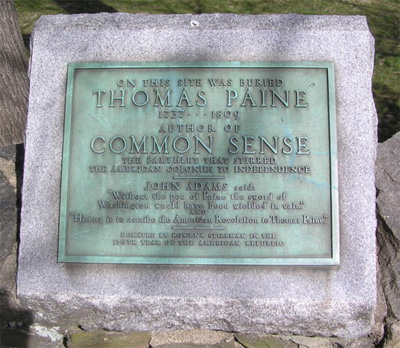Thomas Paine
This content was compiled/created by Kelley Delaney.
In Brief:
Thomas Paine was born in England but emigrated to the new world in 1774 just before the revolution. He became famous across the colonies in 1776 when his widely-read pamphlet ‘Common Sense’ argued that America should break free from Britain. This and some of his later writings had the effect of providing great encouragement to the American Revolution. His writings also inspired the later French Revolution.
…………………………………………………………………………………………………………………………………………………………………………………………………..
“These are the times that try men’s souls.” This simple quotation from Founding Father Thomas Paine’s The Crisis not only describes the beginnings of the American Revolution, but also the life of Paine himself. Throughout most of his life, his writings inspired passion, but also brought him great criticism. He communicated the ideas of the Revolution to common farmers as easily as to intellectuals, creating prose that stirred the hearts of the fledgling United States. He had a grand vision for society: he was staunchly anti-slavery, and he was one of the first to advocate a world peace organization and social security for the poor and elderly. But his radical views on religion would destroy his success, and by the end of his life, only a handful of people attended his funeral.
Brief Biography
On January 29, 1737, Thomas Paine was born in Thetford, England. His father, a corseter, had grand visions for his son, but by the age of 12, Thomas had failed out of school. The young Paine began apprenticing for his father, but again, he failed. So, now age 19, Paine went to sea. This adventure didn’t last too long, and by 1768 he found himself as an excise (tax) officer in England. Thomas didn’t exactly excel at the role, getting discharged from his post twice in four years, but as an inkling of what was to come, he published The Case of the Officers of Excise (1772), arguing for a pay raise for officers. In 1774, by happenstance, he met Benjamin Franklin in London, who helped him emigrate to Philadelphia.
Contribution to the American Revolution
His career turned to journalism while in Philadelphia, and suddenly, Thomas Paine became very important. In 1776, he published Common Sense, a strong defense of American Independence from England. He traveled with the Continental Army and wasn’t a success as a soldier, but he produced The Crisis (1776-83), which helped inspire the Army. This pamphlet was so popular that as a percentage of the population, it was read by more people than today watch America’s biggest sporting occasion, the ‘Superbowl.’
But, instead of continuing to help the Revolutionary cause, he returned to Europe and pursued other ventures, including working on a smokeless candle and an iron bridge. In 1791-92, he wrote The Rights of Man in response to criticism of the French Revolution. This work caused Paine to be labeled an outlaw in England for his anti-monarchist views. He would have been arrested, but he fled for France to join the National Convention.
Contribution to the French Revolution
By 1793, he was imprisoned in France for not endorsing the execution of Louis XVI. During his imprisonment, he wrote and distributed the first part of what was to become his most famous work at the time, the anti-church text, The Age of Reason (1794-96). He was freed in 1794 (narrowly escaping execution) thanks to the efforts of James Monroe, then U.S. Minister to France. Paine remained in France until 1802 when he returned to America on an invitation from Thomas Jefferson. Paine discovered that his contributions to the American Revolution had been all but eradicated due to his religious views. Derided by the public and abandoned by his friends, he died on June 8, 1809 at the age of 72 in New York City.
History@Banagher College, Coláiste na Sionna, Co. Offaly.
The URI to TrackBack this entry is: http://teachnet.eu/tobrien/about/revolutions/the-american-revolution/thomas-paine/trackback/
Leave a Comment
You must be logged in to post a comment.



